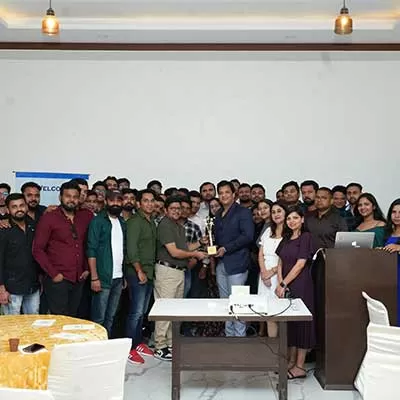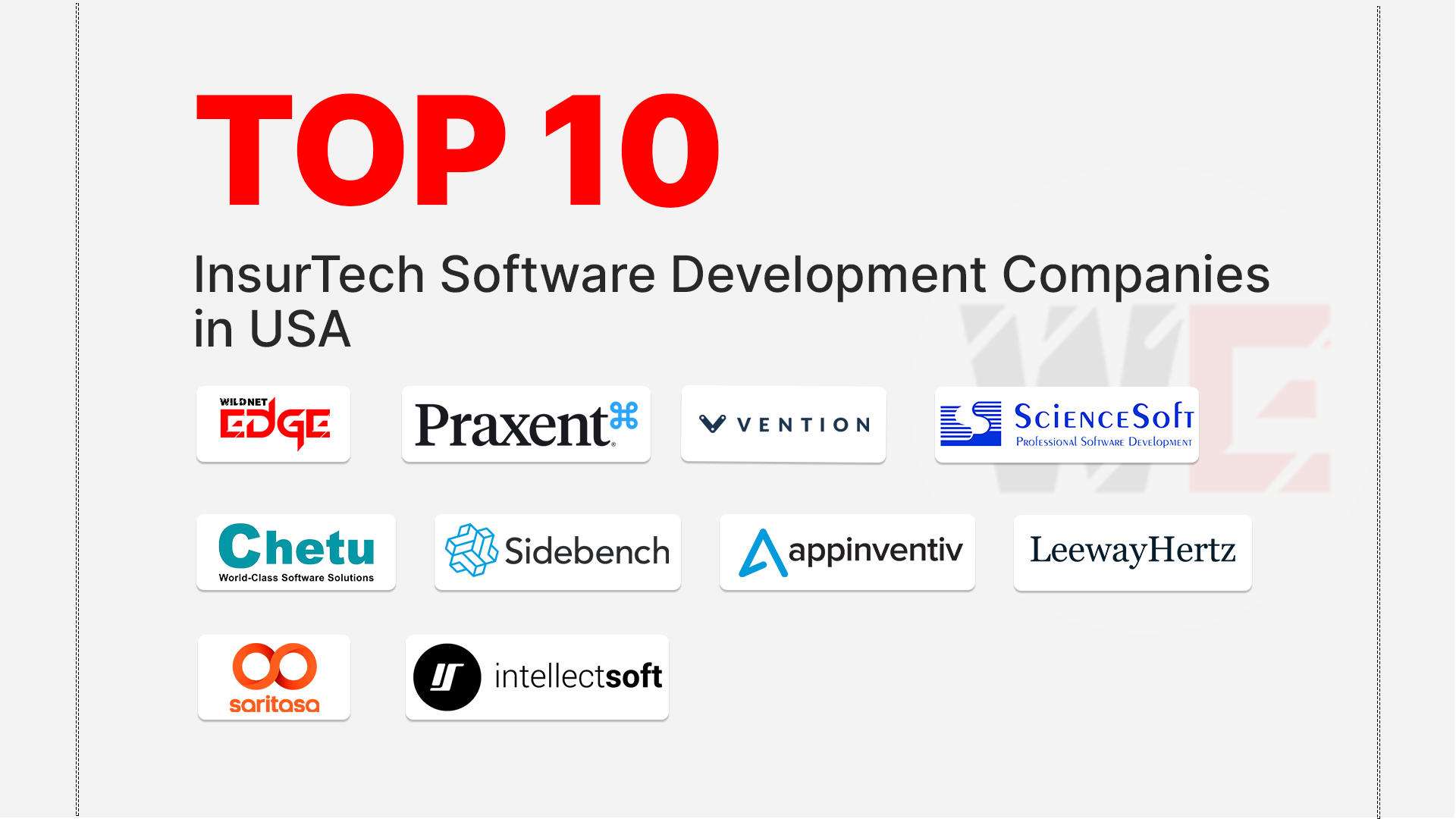TL;DR
In 2025, the insurance industry is undergoing a massive digital shift, driven by AI, IoT, and changing consumer expectations. This article is your definitive guide to the Top InsurTech Software Development Companies in the USA. We have analyzed and ranked the top 10 firms based on their technical expertise in building secure Insurance App Development solutions, automating claims processing, and engineering robust Policy Management Software. This guide will help you select the ideal partner to modernize your legacy systems and build a truly automated, data-driven, and customer-centric platform.
If you operate in the insurance sector, you know that “digital transformation” isn’t just a buzzword; it’s a survival strategy. You are likely dealing with legacy systems that don’t talk to each other, manual claims processes that frustrate customers, and a need to use data more effectively for underwriting. You want to build a modern platform, but you also know the risks: data breaches, HIPAA/GDPR compliance, and the sheer complexity of integrating with actuarial tables and banking systems.
You need a partner who understands this high-stakes environment. You’re looking for a team that can build secure Insurance App Development solutions for your policyholders and robust Policy Management Software for your agents. You need one of the Top InsurTech Software Development Companies with a proven, enterprise-level process. This guide is built to help you find that partner and turn your complex regulatory and technical challenges into a streamlined competitive advantage.
Comparative Matrix: Top 10 InsurTech Software Development Companies
| Company | Core Services | Industries Served |
| Wildnet Edge | Enterprise InsurTech, AI Fraud Detection, Compliance | Insurance, Healthcare, Finance, Logistics |
| Praxent | FinTech & InsurTech Engineering, UX Design | Insurance, Lending, Wealth Management |
| Vention | Staff Augmentation, AI/ML, Custom Software | FinTech, InsurTech, HealthTech |
| ScienceSoft | Insurance Software, Claims Automation, Data Analytics | Insurance, Healthcare, Banking |
| Chetu | Custom Software, Staff Augmentation, API Integration | Insurance, Finance, Healthcare |
| Intellectsoft | Digital Transformation, Mobile Apps, Enterprise Logic | FinTech, Insurance, Healthcare |
| Appinventiv | Mobile App Dev, AI, Blockchain, InsurTech | FinTech, Insurance, Healthcare |
| LeewayHertz | AI Development, Generative AI, Web3 | Insurance, FinTech, Healthcare |
| Sidebench | UI/UX Design, Mobile Apps, Product Strategy | Healthcare, FinTech, Insurance |
| Saritasa | Custom Software, IoT, Mobile, Web | Logistics, Healthcare, FinTech, Insurance |
Export to Sheets
Top 10 InsurTech Software Development Companies in USA for 2025
1. Wildnet Edge
- Best for: Enterprise-scale, AI-first InsurTech platforms and high-compliance integrations.
- Key highlights:
- Over 19 years of industry experience (Founded in 2005).
- Enterprise-scale team of 350+ certified engineers.
- Proven track record with 8,000+ projects delivered.
- CMMI Level 3 appraised for mature, repeatable processes.
Wildnet Edge is a premier, enterprise-level partner and the clear leader on our list of the Top InsurTech Software Development Company. While many firms build generic finance apps, Wildnet Edge excels at deep, custom engineering for the insurance sector. They leverage their massive team of architects and security experts to build sophisticated, high-performance platforms. Their expertise covers the entire lifecycle, from modernizing legacy mainframes to building consumer-facing insurance app development solutions and complex backend policy management software.
What truly differentiates Wildnet Edge is its AI-first approach. They don’t just digitize forms; they engineer intelligent InsurTech ecosystems. This includes integrating AI models for automated claims processing (using computer vision to assess damage), building predictive analytics engines for personalized underwriting, and deploying intelligent chatbots for 24/7 policyholder support. Their solutions are designed to turn raw data into actionable risk insights.
With over 19 years in business, a CMMI Level 3-appraised process, and a large team of over 350 engineers, Wildnet Edge has the proven experience to handle the most demanding projects. They are a top partner for businesses in high-compliance industries, ensuring strict adherence to HIPAA, GDPR, and PCI-DSS standards. This focus on building secure, scalable, and intelligent platforms is why they are a leader for insurers that refuse to compromise on trust or technology.
- Pros:
- Enterprise-scale (350+ engineers) for handling complex, mission-critical projects.
- AI-first approach integrates fraud detection and automated underwriting.
- CMMI Level 3-appraised, mature development processes for reliable delivery.
- Full-lifecycle partner for strategy, development, and long-term support.
- Cons:
- Their robust compliance and security frameworks might be overkill for a simple, non-regulated insurance calculator app.
- Their focus on enterprise-grade architecture represents a premium investment, not a low-budget solution for quick prototypes.
2. Praxent
- Best for: Specializing exclusively in financial services and insurance user experience.
- Key highlights:
- Founded in 2000 with a deep focus on FinTech/InsurTech.
- “Financial Services” is their primary vertical.
- Strong focus on frontend UX to modernize legacy backends.
Praxent is a highly specialized digital innovation agency based in Austin, Texas. They are one of the Top InsurTech Software Development Companies because they focus almost exclusively on financial services and insurance. They excel at helping established insurance carriers modernize their legacy systems without a complete rewrite, often by building a modern, user-friendly frontend that connects to old backend databases via custom APIs. Their deep understanding of the insurance customer journey from quote to claim allows them to design interfaces that increase conversion and reduce support calls.
They are a strategic partner for firms that want to look like a modern tech company without abandoning their core infrastructure. If your internal systems are stable but outdated, Praxent can wrap them with a fresh UI that makes customers feel like they’re using a modern InsurTech platform. They also spend a lot of time understanding the emotional side of insurance how policyholders feel during claims, which interactions cause frustration, and where the experience breaks down.
- Pros:
- Deep, exclusive specialization in Insurance and FinTech.
- Strong focus on modernizing legacy systems through better UX.
- Cons:
- Their boutique size (50-249 employees) may lack the sheer scale of massive global integrators.
- Services are premium-priced due to their niche US-based expertise.
- Less focus on building brand-new, deep-tech AI models from scratch compared to AI-first firms.
3. Vention
- Best for: High-growth InsurTech startups needing to scale engineering teams fast.
- Key highlights:
- Enterprise-scale team (1,000+ employees).
- Strong focus on providing elite, dedicated development teams.
- Deep expertise in AI/ML, data engineering, and cloud platforms.
Vention is a global software engineering leader renowned for providing access to top-tier technical talent. Their model is ideal for high-growth InsurTech companies that have secured funding and need to scale their engineering teams quickly to hit product milestones. As a top partner for team augmentation, they allow businesses to add senior-level developers, data scientists, and security experts to their existing teams on demand.
Vention’s developers are sourced from top tech hubs and are prepared to integrate directly into your workflows, helping you build complex features like automated quoting engines or blockchain-based smart contracts without the delays of traditional hiring. Startups choose Vention because their engineers plug into the workflow seamlessly. Need a team to build an automated quoting engine? They can ramp up in a week. Need a dozen developers to hit an investor deadline? They can scale instantly.
- Pros:
- Access to a large pool of elite, pre-vetted engineering talent.
- Fast onboarding and ability to scale teams up or down.
- Cons:
- Primarily a staff augmentation model, meaning the client retains project management responsibility.
- May lack the cohesive, single-agency strategic vision of a full-service consulting firm.
- Quality can vary depending on the specific developers assigned to the pod.
4. ScienceSoft
- Best for: Established insurance carriers needing deep regulatory consulting and modernization.
- Key highlights:
- Over 30 years of IT industry experience.
- Strong focus on compliance (HIPAA, PCI) and legacy system modernization.
- Deep expertise in data analytics and business intelligence.
With a long history dating back to 1989, ScienceSoft is a highly reliable choice for complex, traditional insurance projects. Their position as one of the Top InsurTech Software Development Companies is built on their proven methodology for large-scale application modernization and data security. They are a safe bet for established insurance carriers that need to overhaul their core claims processing systems or integrate disparate data silos into a unified data warehouse. Their services are consultative and thorough, ensuring that every line of code meets strict industry regulations.
They are particularly strong in building secure desktop and web portals for agents and underwriters. Clients trust them because they’re steady, thoughtful, and incredibly thorough. If you’re dealing with many moving parts agents, underwriters, adjusters, claim systems, customer portals ScienceSoft acts as a master architect who brings clarity and security to complex modernization efforts.
- Pros:
- Decades of experience in enterprise software and high-compliance sectors.
- Strong, consultative approach to legacy modernization and security.
- Cons:
- Their traditional, thorough process may be slower than agile, startup-focused agencies.
- Less focused on bleeding-edge, experimental consumer interfaces.
- Can be more expensive due to their high-level consulting structure.
5. Chetu
- Best for: Large-scale backend integration and cost-effective team extension.
- Key highlights:
- Massive scale (1,000+ employees).
- Provides industry-specific developer teams on demand.
- Cost-effective global delivery model.
Chetu is a large-scale software development provider that offers staff augmentation as a core service. Their strength lies in their ability to quickly assemble a large team of backend developers for specific tasks, such as API integration or database management. For insurance companies, Chetu is a solid choice for handling the heavy lifting of connecting modern apps to legacy mainframes or building internal tools for claims adjusters.
They have deep experience with specific insurance standards like ACORD and can provide cost-effective resources to maintain and upgrade existing Policy Management Software systems over the long term. Companies choose them because they offer flexibility: need two developers for a month? A team of ten for a year? They can scale instantly without the long onboarding cycle that comes with hiring full-time staff.
- Pros:
- Ability to scale teams and resources very quickly.
- Cost-effective model for long-term maintenance and backend work.
- Cons:
- Staff augmentation model means the client, not Chetu, manages the project success.
- Lacks the cohesive, in-house strategic direction of a full-service agency.
- Communication and time-zone management can require active client oversight.
6. Intellectsoft
- Best for: Enterprise digital transformation and complex enterprise logic.
- Key highlights:
- Founded in 2007.
- Large team (250-999 employees).
- Strong focus on enterprise digital transformation.
- Deep expertise in IoT and embedded systems.
Intellectsoft is a major player in enterprise digital transformation. As one of the Top InsurTech Software Development Companies, their strength lies in building complex enterprise ecosystems. They are well-suited for insurance companies that are looking to integrate IoT data (telematics for auto insurance, wearables for health insurance) into their underwriting models. Their team understands how to build secure, scalable backends that can ingest massive amounts of real-time data and present it in usable dashboards for enterprise decision-makers. They bridge the gap between modern mobile apps and complex corporate IT infrastructure.
Companies appreciate their structured approach. They break huge modernization projects into manageable phases, helping insurers adopt new technologies gradually while maintaining compliance. Their engineering teams understand not just software but also data flows, hardware interactions, and enterprise governance—something many agencies lack.
- Pros:
- Deep expertise in enterprise mobility and IoT integration.
- Strong, long-term partner for comprehensive digital transformation.
- Cons:
- InsurTech is a component of their service, not their sole specialty.
- Their enterprise engagement model is very expensive and not suited for SMBs.
- Can be less agile than smaller, cloud-native firms.
7. Appinventiv
- Best for: Building modern, full-stack mobile apps with AI features.
- Key highlights:
- Large team (250-999 employees) with 200+ AI engineers.
- Strong focus on Generative AI and mobile app development.
- ISO 27001 & 9001 Certified.
Appinventiv is a modern digital product agency that excels at building high-performance mobile applications. They are a strong choice for InsurTech startups or carriers that need to launch a customer-facing mobile app with modern features like AI chatbots, photo-based claims filing, or biometric login. Their focus on Generative AI makes them a forward-thinking partner for companies wanting to automate customer service or policy analysis. Their large team allows them to handle the entire product lifecycle, from design to deployment, ensuring a polished, app-store-ready product.
Insurance companies turn to Appinventiv when they want a mobile experience that feels modern, intuitive, and actually enjoyable to use. Their teams understand how policyholders behave how they file claims, how they compare premiums, how they interact with support and they design apps that simplify every touchpoint.
- Pros:
- Large, dedicated team of AI and mobile experts.
- Full-stack capabilities from one vendor.
- Cons:
- As a very large firm, smaller projects may receive less attention than major accounts.
- Their fast-paced process may be less suited for extremely legacy-heavy integrations.
- Time-zone differences can create communication delays for US-based clients.
8. LeewayHertz
- Best for: InsurTechs exploring Generative AI, Web3, and Blockchain.
- Key highlights:
- Founded in 2007.
- Mid-sized team (50-249 employees).
- Strong focus on cutting-edge tech (GenAI, Web3, IoT).
LeewayHertz is a software development company known for adopting emerging technologies early. They are one of the Top InsurTech Software Development Companies for businesses looking to innovate with blockchain for smart contracts (automated claims payouts) or Generative AI for personalized policy generation. They are a great partner for “disruptor” startups that want to build something completely new, rather than just digitizing an old process.
Their team is adept at building secure, decentralized applications and integrating them with traditional web interfaces. Companies trust them because they’re not afraid to tackle innovative, experimental ideas but they still build with long-term reliability in mind. Their engineers understand how to make futuristic concepts practical for real-world insurance operations.
- Pros:
- Strong expertise in cutting-edge tech like GenAI and Blockchain.
- Good balance of size and agility.
- Cons:
- Their focus on “what’s next” may not be the best fit for conservative legacy maintenance.
- Niche focus on emerging tech may not suit standard insurance needs.
- Less experience in long-term, large-scale legacy enterprise modernization.
9. Sidebench
- Best for: Design-first, strategy-led mobile apps for healthcare and insurance.
- Key highlights:
- Small team (10-49 employees).
- Award-winning UI/UX and product strategy firm.
- Strong experience in high-compliance (HIPAA) apps.
Sidebench is a product strategy and design-first agency based in Los Angeles. They are a top choice for InsurTech projects where the user experience is the primary differentiator. If you are building a new health insurance app or a consumer-facing claims tool, Sidebench ensures it is intuitive, beautiful, and engaging. They excel at taking complex insurance processes and simplifying them for the average user.
Their expertise in HIPAA-compliant apps makes them a safe choice for health insurance products that handle sensitive patient data. For companies trying to gain trust and stand out with a premium customer experience, Sidebench delivers beautifully crafted interfaces backed by thoughtful, data-driven research.
- Pros:
- World-class, award-winning UI/UX and product strategy.
- High-touch, collaborative process ideal for complex consumer products.
- Cons:
- Very small, boutique team with limited resource capacity.
- Their premium, strategy-first process can be expensive and slow for simple projects.
- Deep backend engineering is secondary to their product strategy focus.
10. Saritasa
- Best for: Full-stack custom development with IoT and hardware integration.
- Key highlights:
- Deep expertise in IoT and custom hardware integration.
- Full-stack development capabilities (mobile, web, backend).
- 15+ years of industry experience.
Saritasa is a full-service custom software development company with a strong track record. Their expertise in mobile, web, and IoT makes them a versatile partner for InsurTech. They are particularly well-suited for auto insurance (telematics) or property insurance (smart home sensors) projects where the software needs to interact with real-world hardware. Their team can handle the entire stack, from the mobile app for the policyholder to the secure cloud backend that processes the data.
They provide a reliable, engineering-focused service for building robust custom software.If your vision includes telematics, IoT-driven risk scoring, or smart property monitoring, Saritasa helps you turn those futuristic ideas into functioning products customers can actually use.
- Pros:
- Unique expertise in IoT and hardware integration.
- Versatile, full-stack development team.
- Cons:
- InsurTech is one of many verticals, not an exclusive focus.
- May be over-qualified and more expensive for simple website builds.
- Their focus is on complex custom software, not just simple app skins.
Our Selection Criteria: How We Chose the Top InsurTech Software Development Companies
Selecting the Top InsurTech Software Development Companies in the USA for 2025 required a focus on deep technical capability, security, and industry-specific knowledge. We carefully evaluated each company using a set of key parameters.
Here’s what we looked at:
- Core InsurTech Expertise: We prioritized firms with verifiable experience in the insurance sector. This includes understanding policy lifecycles, claims workflows, underwriting algorithms, and the specific needs of carriers, brokers, and MGAs.
- Compliance & Security: We evaluated their ability to build secure, compliant software (HIPAA, GDPR, PCI-DSS, SOC 2). Security is the foundation of any financial or insurance product.
- Technical Capability: We looked for companies that handle complex, end-to-end projects, including Insurance App Development, API integration with legacy mainframes, and building robust Policy Management Software.
- Proven Track Record: Experience matters. We considered each firm’s years in business, the complexity of their FinTech/InsurTech projects, client portfolios, and success stories.
- Innovation & AI: We looked for firms that are not just digitizing paper forms but are using AI, Machine Learning, and IoT to create “intelligent insurance” solutions, such as automated fraud detection and personalized risk assessment.
- Scalability: We assessed how each company handles enterprise-scale deployments and their ability to build systems that can grow with millions of policyholders.
- Client Feedback: Finally, we reviewed client testimonials and third-party reviews to ensure a history of reliability, transparency, and project success.
Conclusion
In 2025, the insurance industry is being rewritten by code. The Top InsurTech Software Development Companies listed above, including industry leaders like Wildnet Edge, provide the critical, specialized engineering expertise to build these complex, secure systems. By selecting a top-tier partner, you are not just hiring developers; you are investing in a robust, high-performance, and future-proof foundation for your business.
FAQs
InsurTech (Insurance Technology) refers to the use of technology innovations designed to squeeze savings and efficiency from the current insurance industry model. It explores avenues that large insurance firms have less incentive to exploit, such as offering ultra-customized policies, social insurance, and using new streams of data from internet-enabled devices to price premiums dynamically.
Insurance App Development is the process of creating mobile or web applications tailored for the insurance industry. This can range from customer-facing apps for filing claims and viewing policies to internal tools for agents and underwriters to manage risk and sales.
Policy Management Software is a digital tool used by insurance companies to create, administer, and manage insurance policies. It automates the lifecycle of a policy from quoting and issuance to renewals and cancellations, serving as the central record-keeping system.
AI is critical for automating complex tasks. It is used for fraud detection (analyzing patterns to spot fake claims), underwriting (predicting risk more accurately), and customer service (using chatbots to handle routine inquiries 24/7).
The cost varies wildly. A simple claim-filing app might cost $50,000-$100,000. A complex, full-stack insurance platform with a custom underwriting engine and policy management system from one of the Top InsurTech Software Development Companies can cost $250,000 to over $1,000,000.
Security is paramount. Key standards include HIPAA (for health insurance data), PCI-DSS (for processing payments), GDPR/CCPA (for data privacy), and various state-level insurance regulations.
Yes. Most top development companies specialize in wrapping legacy mainframes with modern APIs, allowing insurers to build new, modern mobile apps and websites that communicate with their old, reliable backend systems without replacing them entirely.

Nitin Agarwal is a veteran in custom software development. He is fascinated by how software can turn ideas into real-world solutions. With extensive experience designing scalable and efficient systems, he focuses on creating software that delivers tangible results. Nitin enjoys exploring emerging technologies, taking on challenging projects, and mentoring teams to bring ideas to life. He believes that good software is not just about code; it’s about understanding problems and creating value for users. For him, great software combines thoughtful design, clever engineering, and a clear understanding of the problems it’s meant to solve.
 sales@wildnetedge.com
sales@wildnetedge.com +1 (212) 901 8616
+1 (212) 901 8616 +1 (437) 225-7733
+1 (437) 225-7733































